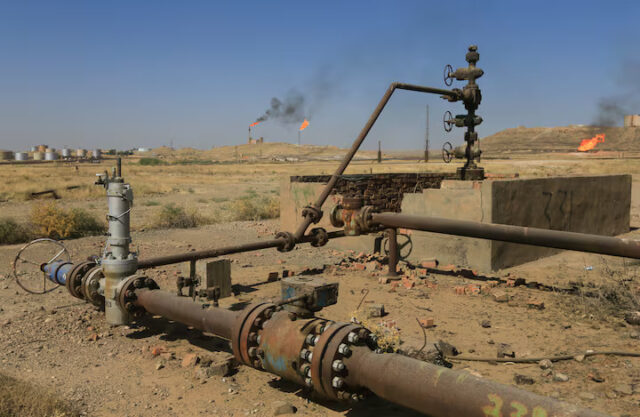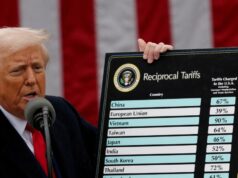The Trump administration is intensifying pressure on Iraq to permit the resumption of Kurdish oil exports or risk facing sanctions, similar to those imposed on Iran, according to eight sources with direct knowledge of the situation, Reuters reported.
The U.S. aims to resume oil exports from Iraq’s Kurdistan region to counterbalance a potential decline in Iranian oil exports, which it seeks to reduce to zero as part of its “maximum pressure” campaign against Iran. This effort is designed to isolate Iran economically and hinder its nuclear weapons development.
Iraq’s oil minister unexpectedly announced on Monday that Kurdish oil exports would resume next week, ending a nearly two-year dispute that had cut over 300,000 barrels per day. Sources in Baghdad, Washington, and Erbil indicated that the pressure from the new U.S. administration played a significant role in the decision. The sources spoke on condition of anonymity due to the sensitive nature of the issue.
Iran sees Iraq as crucial for its economy amid sanctions, but Baghdad, balancing ties with both the U.S. and Iran, is cautious about Trump’s policy to pressure Tehran. Trump is pushing Iraqi Prime Minister Mohammed Shia al-Sudani to cut economic and military ties with Iran. Recently, Iraq’s central bank blocked five private banks from dollar access at the U.S. Treasury’s request. Iraq’s announcement to resume oil exports was rushed and lacked details on resolving technical issues before restarting flows, according to sources.
Iran has significant military, political, and economic influence in Iraq through Shi’ite militias and supportive political parties. However, increased U.S. pressure comes as Iran faces setbacks from Israeli attacks on its regional proxies.
Curb Smuggling
Since the pipeline to Turkey’s Ceyhan port closed in 2023, Kurdish oil has been smuggled to Iran by truck. The U.S. is pressuring Baghdad to stop this flow, with around 200,000 barrels per day of discounted crude continuing to be smuggled, primarily to Iran and occasionally to Turkey, according to sources.
“Washington is pressuring Baghdad to ensure Kurdish crude is exported to global markets through Turkey rather than being sold cheaply to Iran,” said an Iraqi oil official with knowledge of the crude trucking shipments crossing to Iran.
Since the closure of the Turkish pipeline, Kurdish oil smuggling via Iran has increased, with a broader network reportedly generating at least $1 billion annually for Iran and its proxies since Prime Minister al-Sudani took office in 2022. Two U.S. officials confirmed that the U.S. has urged Iraq to resume Kurdish oil exports to help reduce upward pressure on oil prices.
Asked about the administration’s pressuring of Iraq to open up Kurdish oil exports, a White House official said: “It’s not only important for regional security that our Kurdish partners be allowed to export their own oil but also help keep the price of gas low.”
The U.S. and Kurdistan have closely cooperated militarily against ISIS. After returning to office in January, Trump revived the “maximum pressure” campaign on Iran, aiming to eliminate its oil exports and block its access to Iraq’s financial system. Trump also sought to lower energy costs for Americans, but reduced Iranian oil exports could lead to higher global oil and gasoline prices.
The resumption of Kurdish exports would help offset some of the loss to global supply of lower Iranian exports, but would cover only a fraction of the more than 2 million bpd of crude and fuel that Iran ships. However, Iran has proven adept in the past at finding means to circumvent U.S. sanctions on its oil sales.
Ole Hansen, head of commodity strategy at Saxo Bank, said the restart of exports from Kurdistan could help increase global oil supplies at a time when output was disrupted from other regions, such as Kazakhstan, where exports have dropped this week following a Ukrainian drone attack on a major pipeline pumping station in southern Russia.
“At this point in time, I believe the market has adopted a relatively neutral but nervous stance on crude oil prices,” he said.
Hurdles To Restart
Turkey halted the Kurdish oil pipeline in March 2023 following an ICC ruling ordering Ankara to pay Baghdad $1.5 billion for unauthorized exports between 2014 and 2018. Ongoing issues with payment, pricing, and maintenance remain unresolved, and recent talks in Erbil failed to reach an agreement.
The federal government seeks to restart exports without committing to the KRG on payments or clarifying the payment mechanism, according to sources.
“We can’t do that. We need clear visibility on guarantees,” the source said.
Oil companies working in Kurdistan also have questions over payments.
On February 6, DNO executives stated they needed clarity on payment terms for future oil deliveries and how to recover $300 million for oil delivered before the pipeline shutdown. Turkish Energy Minister Alparslan Bayraktar confirmed to Reuters that Turkey had not received any information from Iraq regarding the resumption of oil flows.
A restart could also cause issues in OPEC+, or the Organization of the Petroleum Exporting Countries plus Russia and other allies, where Iraq has been under pressure to comply with its pledge to reduce its output. Additional supply from the Kurdish region could put Iraq over its OPEC+ supply target.
An Iraqi official said it was possible for Iraq to restart the pipeline and remain compliant with OPEC+ supply policy.
Giovanni Staunovo, a commodity analyst at investment bank UBS, said the overall impact of the resumption could be muted.
“From an oil market perspective, Iraq is bound to the OPEC+ production deal, so I wouldn’t expect additional production from Iraq in case of a pipeline restart, but just a change in the way it is exported (currently, among others, using trucks),” he said.
(With inputs from Reuters)





